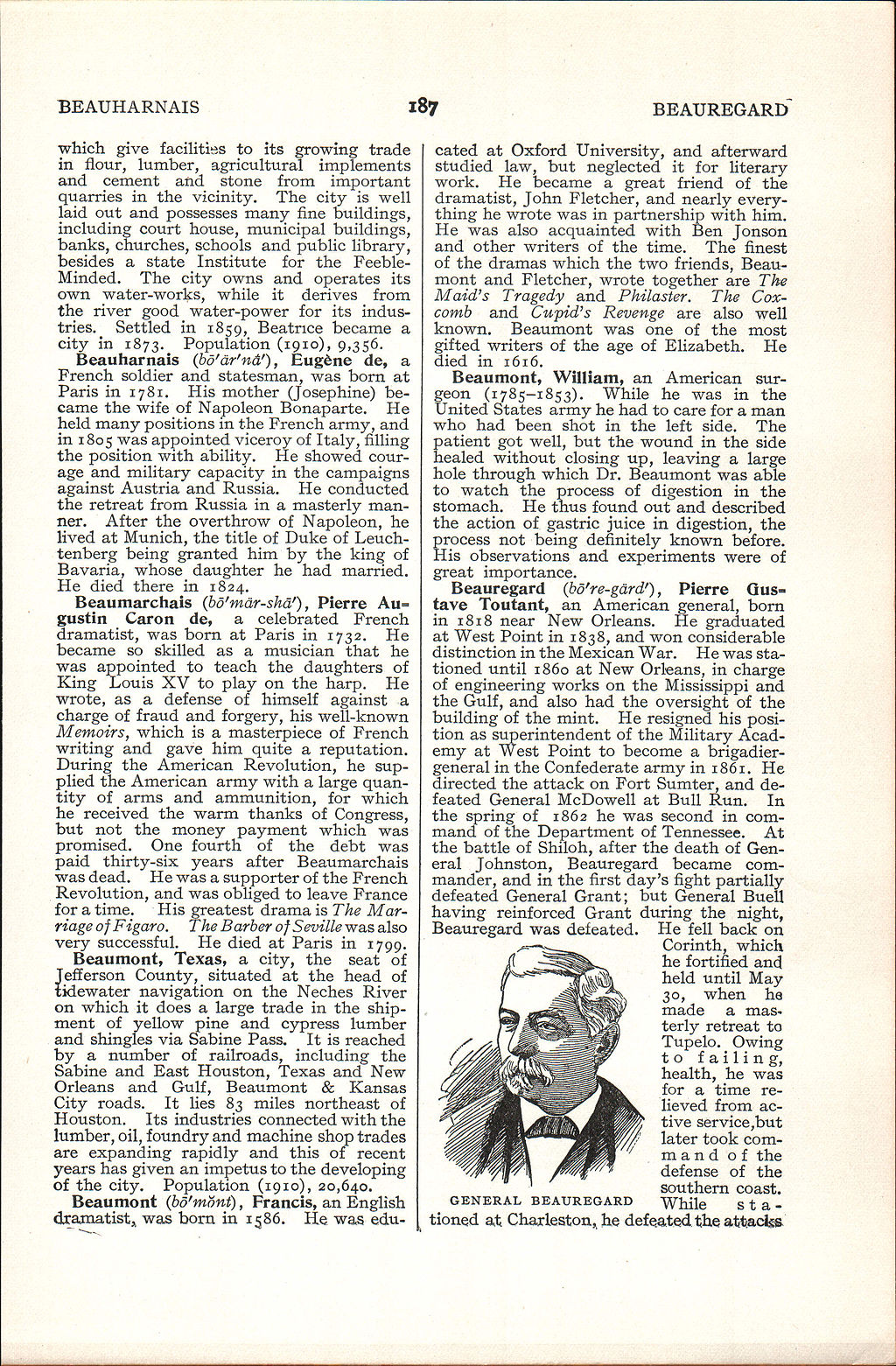which give facilities to its growing trade in flour, lumber, agricultural implements and cement and stone from important quarries in the vicinity. The city is well laid out and possesses many fine buildings, including court house, municipal buildings, banks, churches, schools and public library, besides a state Institute for the Feeble-Minded. The city owns and operates its own water-works, while it derives from the river good water-power for its industries. Settled in 1859, Beatrice became a city in 1873. Population (1910), 9,356.
Beauharnais (bō'är'nā′), Eugène de, a French soldier and statesman, was born at Paris in 1781. His mother (Josephine) became the wife of Napoleon Bonaparte. He held many positions in the French army, and in 1805 was appointed viceroy of Italy, filling the position with ability. He showed courage and military capacity in the campaigns against Austria and Russia. He conducted the retreat from Russia in a masterly manner. After the overthrow of Napoleon, he lived at Munich, the title of Duke of Leuchtenberg being granted him by the king of Bavaria, whose daughter he had married. He died there in 1824.
Beaumarchais (bō'mär-shā′), Pierre Augustin Caron de, a celebrated French dramatist, was born at Paris in 1732. He became so skilled as a musician that he was appointed to teach the daughters of King Louis XV to play on the harp. He wrote, as a defense of himself against a charge of fraud and forgery, his well-known Memoirs, which is a masterpiece of French writing and gave him quite a reputation. During the American Revolution, he supplied the American army with a large quantity of arms and ammunition, for which he received the warm thanks of Congress, but not the money payment which was promised. One fourth of the debt was paid thirty-six years after Beaumarchais was dead. He was a supporter of the French Revolution, and was obliged to leave France for a time. His greatest drama is The Marriage of Figaro. The Barber of Seville was also very successful. He died at Paris in 1799.
Beaumont, Texas, a city, the seat of Jefferson County, situated at the head of tidewater navigation on the Neches River on which it does a large trade in the shipment of yellow pine and cypress lumber and shingles via Sabine Pass. It is reached by a number of railroads, including the Sabine and East Houston, Texas and New Orleans and Gulf, Beaumont & Kansas City roads. It lies 83 miles northeast of Houston. Its industries connected with the lumber, oil, foundry and machine shop trades are expanding rapidly and this of recent years has given an impetus to the developing of the city. Population (1910), 20,640.
Beaumont (bō′mŏnt), Francis, an English dramatist, was born in 1586. He was educated at Oxford University, and afterward studied law, but neglected it for literary work. He became a great friend of the dramatist, John Fletcher, and nearly everything he wrote was in partnership with him. He was also acquainted with Ben Jonson and other writers of the time. The finest of the dramas which the two friends, Beaumont and Fletcher, wrote together are The Maid's Tragedy and Philaster. The Coxcomb and Cupid's Revenge are also well known. Beaumont was one of the most gifted writers of the age of Elizabeth. He died in 1616.
Beaumont, William, an American surgeon (1785-1853). While he was in the United States army he had to care for a man who had been shot in the left side. The patient got well, but the wound in the side healed without closing up, leaving a large hole through which Dr. Beaumont was able to watch the process of digestion in the stomach. He thus found out and described the action of gastric juice in digestion, the process not being definitely known before. His observations and experiments were of great importance.

|
| GENERAL BEAUREGARD |
Beauregard (bō′re-gärd′), Pierre Gustave Toutant, an American general, born in 1818 near New Orleans. He graduated at West Point in 1838, and won considerable distinction in the Mexican War. He was stationed until 1860 at New Orleans, in charge of engineering works on the Mississippi and the Gulf, and also had the oversight of the building of the mint. He resigned his position as superintendent of the Military Academy at West Point to become a brigadier-general in the Confederate army in 1861. He directed the attack on Fort Sumter, and defeated General McDowell at Bull Run. In the spring of 1862 he was second in command of the Department of Tennessee. At the battle of Shiloh, after the death of General Johnston, Beauregard became commander, and in the first day's fight partially defeated General Grant; but General Buell having reinforced Grant during the night, Beauregard was defeated. He fell back on Corinth, which he fortified and held until May 30, when he made a masterly retreat to Tupelo. Owing to failing, health, he was for a time relieved from active service, but later took command of the defense of the southern coast. While stationed at Charleston, he defeated the attacks
